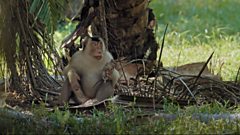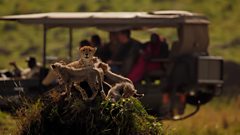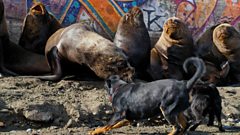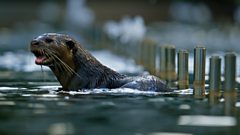Mammals have mastered every environment on Earth, but today the planet is changing faster than ever. Mammals must change with it to have a chance of survival in this, the new wild.
For millions of years, mammals have evolved to master every environment on Earth, but the planet is changing rapidly, all thanks to one mammal in particular - humans. As mankind reshapes the face of the world, mammals must change with it if they are to survive, let alone thrive. Today, some are finding clever and surprising ways to make the most of this new wild, while others need a helping hand from us.
In the busy fish markets of Chile, sea lions have found an easy meal, but not everyone is so tolerant of these new neighbours. Living on the urban edge has brought them into fierce conflict with stray dogs, which makes life here a dangerous undertaking.
The waterways of Singapore make an ideal home for otters. Here, its most daring family has learnt to cross busy highways amongst the bustling heart of the city. But daily road crossings mean that some struggle to keep up and get left behind, making it difficult to reunite with their family amongst the crowded city. For some mammals it can be harder to fit in to the new wild. Elephants have learnt to use the cover of darkness to venture into our towns in search of a midnight feast, often leaving destruction in their wake.
As the human population grows, we need increasing amounts of space to grow food. The palm oil plantations of south east Asia seem devoid of life, but they harbour a new and surprising opportunity for a troop of resourceful pig-tailed macaques.
Though many mammals have learnt to adapt to our changing world, for others the new pressures can be more challenging. With water from river systems being diverted for agriculture, in Tanzania, hippos are forced to compete fiercely for space in the few remaining water holes, or risk being left out in the open and stranded in the heat. For Indian wolves, their keen sense of smell enables them to seek refuge in the only place humans don’t dare go – the abandoned minefields left over from a war between Israel and Syria. Protected by the deadly mines, this unusual sanctuary has enabled the wolves a safe place to rear their young.
American buffalo or bison were driven to near extinction by hunting, but following part domestication, vast managed herds fill their ancestral plains once again.
Balance is critical in today’s new wild, and space is vital to protect wildlife. African parks and reserves have created essential space for the cheetah, but in some places, the wilderness is becoming overcrowded, and sometimes at a deadly cost. In areas of high tourism, the chance of cheetah cub survival is severely reduced.
In order to survive, some of the world’s most iconic mammals need support. The blue whale has cruised the ocean for millions of years, but today’s ocean is a bustling highway, with tens of thousands of cargo ships in operation around the globe. Collisions pose a serious threat to the population, but scientists have been gathering valuable data in order to help not just the biggest mammal of all, but the biggest animal to have ever lived - the blue whale. The more we learn, the better we can find a balance and share our rapidly changing planet with our fellow mammals.
Last on
Clips
-
![]()
Macaques aren't just vegetarians
Duration: 01:35
-
![]()
Loving cheetahs to death
Duration: 03:00
-
![]()
Dogs vs sea lions
Duration: 03:00
-
![]()
Otters in the city
Duration: 02:01
Credits
| Role | Contributor |
|---|---|
| Narrator | David Attenborough |
| Producer | Lydia Baines |
| Series Producer | Scott Alexander |
| Executive Producer | Roger Webb |
Broadcasts
- Sun 7 Apr 2024 19:00
- Sun 14 Apr 2024 12:30�鶹������ҳ��� Two Northern Ireland & Northern Ireland HD only
- Sun 14 Apr 2024 15:15�鶹������ҳ��� Two except Northern Ireland & Northern Ireland HD
- Fri 14 Jun 2024 08:00






